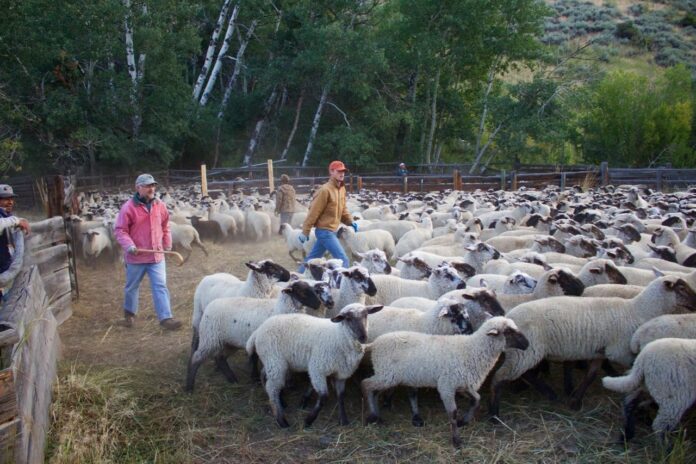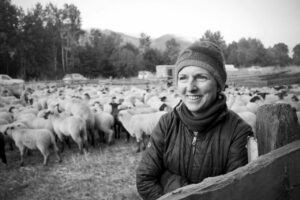
Hailey-based sheep farm garners 2 eco-friendly certifications
By Eric Valentine

The Valley famous for its trailing of the sheep festivities is also getting recognized for keeping its livestock happy and its farming practices green. That’s in part due to two recent certifications of Lava Lake Land & Livestock for the Hailey-based farm’s treatment of its sheep and its commitment to keeping its livestock grassfed.
A Greener World—one of North America’s most trusted and transparent farm certifiers—announced last week it had certified Lava Lake Land & Livestock as Animal Welfare Approved and Grassfed. These certifications are, essentially, food labels that let consumers know the product has been raised outdoors on pasture or range in accordance with the highest animal welfare standards in the United States and Canada, using sustainable agriculture methods. Consumer Reports has rated A Greener World’s Animal Welfare Approved certification as the only “highly meaningful” label for farm animal welfare, outdoor access and sustainability—and the only animal welfare certification in which they have confidence.
The certification is the first of its kind in Idaho for sheep farming.
“It was a very detailed audit,” said Brian Bean, who along with his wife Kathleen own and operate Valley-area farmland primarily for raising sheep and some cattle. “We do a lot of (eco-friendly) things we like to get credit for. It’s always nice to be able to market the product so that the consumer knows it meets stringent requirements.”
Lava Lake’s grassfed lambs range freely, grazing on the natural bounty of a vast and biologically diverse landscape, resulting in fit, healthy animals that make the most delicious, tender, nutrient-rich meat. The ranch uses rotational grazing practices and sustainable farming techniques, which results in lower environmental impact and a higher quality product.
Betting the Farm
A Greener World’s stringent requirements are something the Beans are used to. Outright, the Beans own 20,000 acres of land east of Carey but also operate more than 800,000 acres of adjoining farmland covering parts of three counties—Blaine, Butte and Custer. “A complex tapestry of public and private lands,” as Brian Bean describes it.
That complex tapestry is due to Idaho being a so-called homestead state. The Homestead Acts allowed small farmers to acquire ownership of government land. The first of the acts, the Homestead Act of 1862, opened up millions of acres. Any adult who had never taken up arms against the federal government of the United States could apply. But that didn’t mean all the acreage got sold. So today, farmers like the Beans navigate through roughly 35 different federal, state and local agencies to deliver to market grassfed lamb and some beef raised within those 800,000-plus acres.
Emily Moose (we swear we are not making up these last names) is the communications director for A Greener World. She describes her organization’s role to be one of making the U.S. food system as “more transparent and less opaque.” This is done by auditing a farm for everything from its soil quality to how it treats its animals and its workers. Once the farm earns certification, A Greener World then performs annual audits to ensure standards are still being met.
“What we’re doing is making it possible for consumers to enact their values when they purchase their food,” Moose said.
For Brian Bean, the challenge wasn’t so much making sure his farm met requirements. He says they’ve been operating essentially the same way since they started in 1999. The Beans have even been involved in additional environmental stewardship programs such as the non-lethal measures to control the wolf population. The bigger challenge, he says, is finding the slaughterhouses that also maintain standards that can be verified by A Greener World, as slaughtering and fabricating (cutting the meat into market-ready pieces) is part of the approval process.
Meat Marketing
Beyond issuing the certification labels that will get placed on the packaged meat, there are other services A Greener World provides farmers. The organization issues press releases upon certification and provides space on its website where farms can list their contact and sales information. This is especially helpful for the farm-to-farm sales that need to occur to bring enough meat to market that meets demand.
A Greener World now issues five separate certifications. They are: Certified Animal Welfare Approved, Salmon Welfare Certified, Certified Grassfed, Certified Regenerative, and Certified Non-GMO.
The nonprofit also provides information helpful to the general public to help people make informed food choices, including an Online Directory of certified farms and products and Food Labels Exposed—a guide to food label claims available in print and online. For more information, visit agreenerworld.org.


